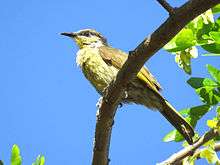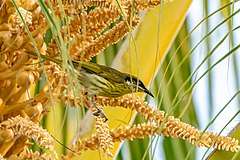Varied honeyeater
The varied honeyeater (Gavicalis versicolor) is a species of bird in the family Meliphagidae. It is found in coastal areas of New Guinea and eastern Cape York Peninsula. Its natural habitat is subtropical or tropical mangrove forests.
| Varied honeyeater | |
|---|---|
 | |
| Scientific classification | |
| Kingdom: | Animalia |
| Phylum: | Chordata |
| Class: | Aves |
| Order: | Passeriformes |
| Family: | Meliphagidae |
| Genus: | Gavicalis |
| Species: | G. versicolor |
| Binomial name | |
| Gavicalis versicolor (Gould, 1843) | |
| Synonyms | |
|
Lichenostomus versicolor | |
The varied honeyeater was previously placed in the genus Lichenostomus, but was moved to Gavicalis after molecular phylogenetic analysis, published in 2011, showed that the original genus was polyphyletic.[2][3]
Gallery
gollark: Other human subspecies. It's not actually very scary.
gollark: I see.
gollark: I, at least, do not really want to be stuck with today's hardware limitations forever.
gollark: Which one?
gollark: I mostly meant that it is quite complex to make and if you want nicer ones you need to throw even more industry at it.
References
- BirdLife International (2012). "Gavicalis versicolor". IUCN Red List of Threatened Species. 2012. Retrieved 26 November 2013.CS1 maint: ref=harv (link)
- Nyári, Á.S.; Joseph, L. (2011). "Systematic dismantlement of Lichenostomus improves the basis for understanding relationships within the honeyeaters (Meliphagidae) and historical development of Australo–Papuan bird communities". Emu. 111: 202–211. doi:10.1071/mu10047.
- Gill, Frank; Donsker, David (eds.). "Honeyeaters". World Bird List Version 6.1. International Ornithologists' Union. Retrieved 28 January 2016.
This article is issued from Wikipedia. The text is licensed under Creative Commons - Attribution - Sharealike. Additional terms may apply for the media files.

